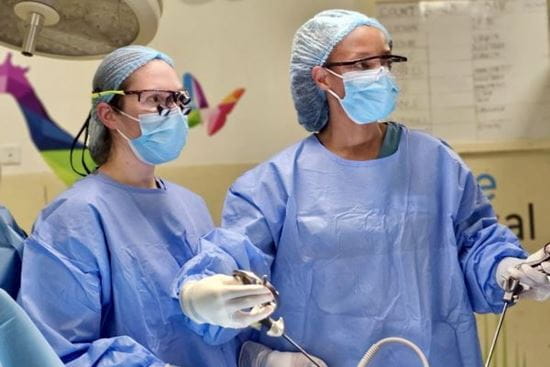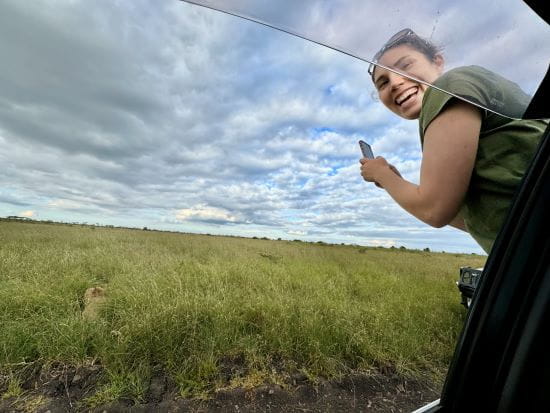At the start of 2024, Department of Surgery Pediatric Surgery Fellow, Sarah Tracy, MD, embarked on a transformative journey to Kijabe, Kenya as part of her global surgery rotation. Uncertain of what lay ahead, she soon discovered that this experience would shape her pediatric surgery career in a profound way.
“When I first got there, it was a little overwhelming because it's a different hospital compared to what I’ve seen in the United States,” said Tracy. “You can see monkeys going around on the outskirts of the hospital and through hallways in between the wards. Everything was so new there—the smells, the cleaning equipment they use, even the way they set up their wards was different to me.”
Tracy’s rotation was the culmination of years of continuous effort to secure its approval. Thanks to the dedication of department faculty members Brian Gray, MD, and Britney Grayson, MD, PhD, Tracy became the first American pediatric surgery fellow to complete an accredited fellowship rotation abroad.
“She applied the skills she gained from her U.S. residency and fellowship in a new environment, quickly adapting to the hospital and taking call like one of their fellows,” said Gray. “It was a hands-on experience, where she operated and thought independently, while both teaching and learning from the fellows. The goal wasn't to learn new surgical techniques, but to understand how to function as a surgeon in different settings, recognizing strengths and challenges, which will inform her future work and potential involvement in global surgery.”

Throughout her fellowship at Riley Hospital for Children in Indianapolis, Tracy trained in a high-resource setting with an abundance of medical staff and supplies at her fingertips. In Kijabe, Tracy quickly realized resources were scarce, but the goal of providing quality care still persisted.
“They had wards where there was one nurse for ten patients, which was outrageous to me, but that was what they were used to,” said Tracy. “I remember seeing all the equipment they had that was second hand they were making do with. It was incredible to see how they were doing that and the level of care they were able to provide in all areas of the hospital.”
During her time in Kijabe, Tracy was also able to learn more about Kenyan culture. From learning how to address others to incorporating Swahili words into her daily language, Tracy was able to learn more about a way of life different from what she was accustomed to.
“In Kenyan culture, people first address each other in a polite way before getting into what they want to talk about by saying something such as, ‘how are you today?’” said Tracy. “Everyone also speaks English for the most part in Kenya, but they also speak Swahili, which is not a language I'm familiar with. I started to learn a couple of words and use them, which really helped me connect with patients in the clinic setting and in the operating room.”
Now an Assistant Professor and Director of Surgical Oncology in the Division of Pediatric Surgery at the University of Wisconsin School of Medicine and Public Health, Tracy will always remember the strong bond she formed with fellow trainees in Kijabe who were initially strangers only a few weeks prior.
“I formed really close relationships with a number of the trainees while I was there,” said Tracy. “There were times where they would invite me over to their houses for meals, and I would get to meet their families. Those were amazing personal relationships that developed over the course of a very short time.”

Reflecting on her experience, Tracy is deeply grateful to her mentors in the Department of Surgery at IU School of Medicine for providing her the opportunity to participate in a global surgery rotation.
“I’m so thankful to Britney Grayson, MD, PhD, and Brian Gray, MD, because they made this possible for me,” said Tracy. “It was a wonderful trip that I didn't even know I was going to be able to take. It was an amazing rotation, and I wouldn't change it for a thing.”
Thanks to the efforts of Tracy, Gray, Grayson, and many others, future Department of Surgery trainees will have the opportunity to immerse themselves in a global health training environment — an enduring cornerstone of the department's education and training experience.
“At Indiana University, we prioritize global health equity by engaging with hospitals worldwide to both teach and learn,” said Gray. “Through our unique global partnerships, we aim to advance global surgery by training surgeons in advanced techniques and encouraging them to stay and care for patients in their home countries. This exchange not only improves care abroad but also enhances how we care for patients in Indiana.”
.jpg?rev=f54bb06e41d84a8b90360d5821aa71ac&la=en&h=300&w=450&hash=15A5347F286E22FB1052D2BE4D1AA614)